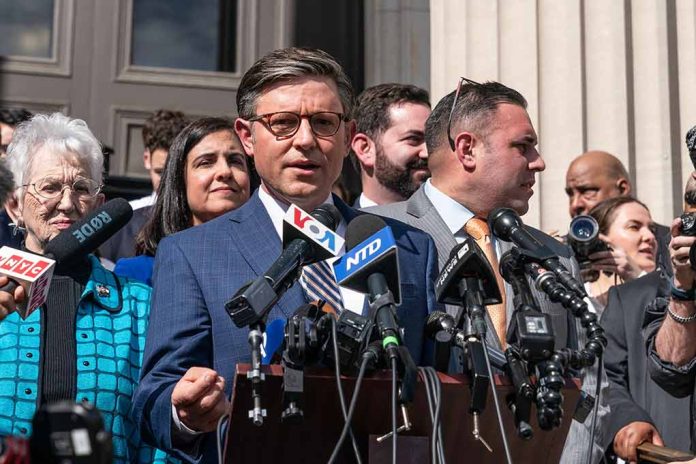
House Speaker Mike Johnson pushes forward with a controversial funding plan that could reshape voter registration in America.
At a Glance
- House to vote on funding bill linking government funding with proof of citizenship for voter registration
- Speaker Johnson determined to hold vote despite previous lack of support
- Democrats strongly oppose the measure, citing potential disenfranchisement
- Republicans argue the mandate is crucial for election integrity
- Donald Trump encourages Republicans to allow partial shutdown if mandate isn’t included
Johnson’s Bold Move on Voter Registration
In a decisive push to secure America’s electoral process, House Speaker Mike Johnson is bringing a crucial funding bill to the floor. This legislation not only addresses government funding but also includes a significant mandate requiring proof of citizenship for voter registration. Despite previously pulling the bill due to insufficient votes, Johnson is now pressing forward, determined to see this measure through.
The inclusion of the citizenship proof requirement in the funding bill reflects a key election-year priority for Republicans. While research indicates that noncitizen voting is rare, Speaker Johnson argues that even a small number of such votes could significantly impact close races. This stance aligns with the GOP’s commitment to enhancing election integrity and ensuring that only eligible citizens participate in the democratic process.
Democratic Opposition and Concerns
Democrats have voiced strong opposition to the measure, warning that it could potentially disenfranchise millions of American citizens. They argue that the mandate is unnecessary and could create barriers to voting for legitimate citizens. This resistance highlights the deep divide between the two parties on issues of voter access and election security.
“This is not going to become law,” said Rep. Pete Aguilar, D-Calif. “This is Republican theatrics that are meant to appease the most extreme members of their conference, to show them that they are working on something and that they’re continuing to support the former president of the United States in his bid to demonize immigrants.”
The Democratic leadership’s firm stance against the bill suggests a challenging path forward for Johnson’s proposal. With the potential for a government shutdown looming, the pressure is mounting on both sides to find a compromise.
Trump’s Influence and Republican Strategy
Former President Donald Trump has weighed in on the debate, encouraging House Republicans to stand firm on the citizenship proof mandate. Trump’s involvement underscores the political significance of this issue for the Republican base. His statement on Truth Social declared, “If Republicans don’t get the SAVE Act, and every ounce of it, they should not agree to a Continuing Resolution in any way, shape, or form.”
“If you have a few thousand illegals participate in the election in the wrong place, you can change the makeup of Congress and you can affect the presidential election,” Johnson said. “The American people understand that.”
This strategy of linking government funding to voter registration requirements is seen by some as a bold move to address concerns about election integrity. However, it also risks a potential government shutdown if a compromise cannot be reached.
The Path Forward
As the House prepares to vote, the outcome remains uncertain. Some Republicans have expressed concerns about the bill’s spending levels, while others are firm in their support for the citizenship proof mandate. The legislation aims to fund agencies at current levels while a full-year spending agreement is negotiated, with a proposed six-month extension through March 28.
Senate Majority Leader Chuck Schumer believes the House vote will fail and has emphasized the need for a bipartisan plan to prevent a government shutdown. Meanwhile, Senate Republican leader Mitch McConnell has stressed the importance of avoiding a shutdown, which he believes would politically harm Republicans.
As the debate continues, the American people watch closely. The outcome of this vote could have far-reaching implications for both government operations and the future of voter registration in the United States. With the clock ticking towards a potential shutdown, all eyes are on Speaker Johnson and his ability to navigate these turbulent political waters.
Sources:
- Speaker Johnson pushes ahead on funding bill with proof of citizenship mandate despite dim prospects
- Speaker Johnson pushes ahead on funding bill with proof of citizenship mandate despite dim prospects







